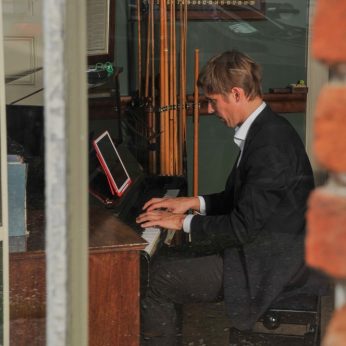Composer: Robert Schumann (b. 1810 - d. 1856)
Performance date: 25/06/2023
Venue: Bantry House
Composition Year: 1854
Duration: 00:10:49
Recording Engineer: Tom Norton
Instrumentation: pf
Instrumentation Category:Solo
Artists:
Cédric Tiberghien -
[piano]

Geistervariationen – Ghost Variations in E flat WoO 24 [1854]
Cédric Tiberghien will round off the Festival’s brief survey of Schumann’s late chamber music with the so-called Ghost Variations, the very last piano work that Schumann wrote.
Although modern commentators tend to be scornful of the Schumann’s family’s determination to hide his late works from posterity, we should remind ourselves of the torment and terror that Clara in particular suffered in the two weeks before Schumann’s suicide attempt and transfer to an asylum. This final catastrophe erupted on the family over a brutal two weeks in February 1854.
It began with terrifying auditory hallucinations that ranged from single notes to angels’ voices to voices of demons, the latter driving him into nervous paroxysms where two doctors could barely hold him down while he screamed in pain. These attacks were worst at night and poor Clara, who was five months pregnant, sat up every night to watch over her demented husband, who believed he was surrounded by angels and demons. As these nocturnal attacks got worse Schumann would try to shout down the voices and he was increasingly afraid that he would physically hurt Clara. This fear led him to beg to be confined in an asylum so he could be cured. Neither he nor his doctors understood that he was suffering the final neurological degeneration caused by the disease he contracted twenty years earlier for which there was no cure.
Outside these attacks he could behave quite normally, correcting proofs of his Cello Concerto, going for walks and conversing rationally with friends. Towards the end he also sat down to write out the angel music that he claimed had been dictated by the spirit of Schubert. This was to become the Ghost Variations. Schumann seems to have been unaware that the angel theme itself was closely related to the slow movement theme from his Violin Concerto composed the previous year.
On 27 February he spent the morning writing out a clean copy of the first four Variations and began working on a fifth. He was being minded by his twelve-year-old daughter Marie. Somehow he slipped past her out into the street in pouring rain wearing only his morning gown and slippers. He paid the toll for the bridge over the Rhine with a silk handkerchief and at this point one suspects romantic embellishment takes over as it seems very unlikely that Schumann would have survived throwing himself into the fast-flowing river in mid-winter. It is more likely the boatmen on the pontoons below the bridge got to him before jumped into the Rhine and took him home surrounded by a crowd of onlookers.
The crazy end to this tragic story is that the next day he was back at his desk finishing the final variation and sending it to Clara as a message. On the doctor’s insistence she had gone to stay with a friend. One wonders whether she played it. Five days later Schuman voluntarily left for the sanatorium at Endenich, where he died two years later. The Variations themselves are very simple, but they carry the terrible weight of their creation.
Francis Humphrys
Copyright © 2025 West Cork Music. All rights reserved.
Designed and developed by Matrix Internet